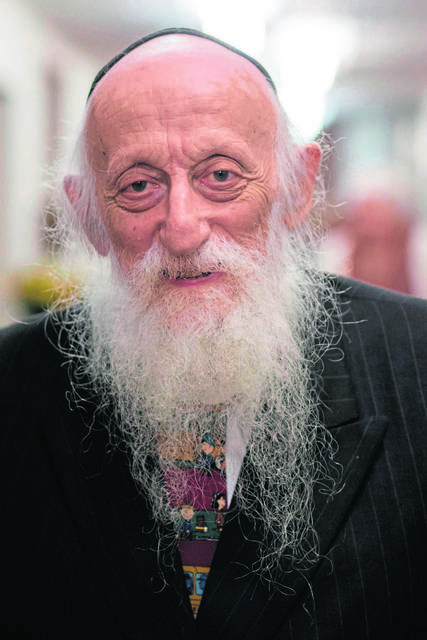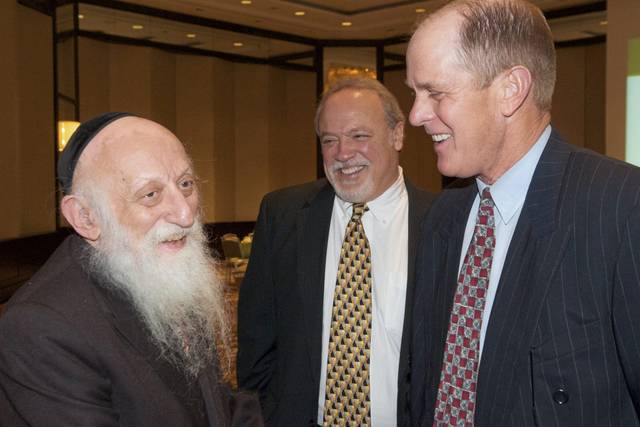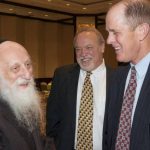With a twinkle in his eye, Rabbi Dr. Abraham Twerski dispensed timeless wisdom others used to solve life’s problems.
“Every time he spoke, people listened,” James Troup, CEO of Gateway Rehab, a regional leader in treatment for addiction that Twerski founded, said Monday. “He just had this aura about him. He had this real calming effect.”
Twerski died Sunday, Jan. 31, in Israel. He had been battling covid-19, his daughter Sarah Twerski said. He was 90.
Scion of a dynastic Jewish family
A Milwaukee native, Twerski was descended on his father’s side from Rabbi Menachem Nachum Twerski, the founder of the Chernobyl Hasidic dynasty known as the Me’or Einayim, a work of Torah commentary he authored. His mother was the daughter of the Bobover Hasidic rebbe, according to a report from the Jewish Telegraphic Agency.
Her father knew about his legacy from a young age, said Sarah Twerski of Squirrel Hill, and was nurtured to become the man he was.
On Monday, she was fielding calls from around the world as people mourned his death and shared their stories about how he’d helped and inspired them, Sarah Twerski said.
“I’ve been getting calls from every facet of life you can imagine,” she said.
In addition to being a rabbi and addiction specialist, Twerski was an author of dozens of books and a psychiatrist.
Found inspiration in Pittsburgh
He came to Pittsburgh in the 1960s for a residency at Western Psychiatric Institute, after graduating from medical school at Marquette University. He later became clinical head of psychiatry at St. Francis Hospital in Lawrenceville, where he developed his passion for treating addiction.
He chose to settle in Pittsburgh because of its vibrant Jewish community, his daughter said.
“Dr. Twerski was a visionary. The world has lost a good man,” retired Gateway CEO Ken Ramsey said. “Our area was blessed that he was here. I was blessed to have the opportunity to work with him for almost 40 years.”
At St. Francis, he treated a woman in her 60s who had struggled with addiction for years, Ramsey said.
Twerski successfully treated the woman, who taught him the basis for his work in treating others with addiction, Ramsey said.
He learned “a lot he didn’t gain from medical school and what a force that it is,” Ramsey said.
“It started from one case at St. Francis,” he said.
Twerski came to realize how widespread addiction issues were in the Pittsburgh area and that there were few treatment options.
Sarah Twerski also remembered the case that inspired her father and said it involved a woman who had once been a “society lady” who lost her social standing and her family because of her addiction to alcohol.
The woman recovered with help from Alcoholics Anonymous, and she kept in contact with Twerski and inspired him to help others, Sarah Twerski said.
“He saw that this really turns people’s lives around,” Sarah said of AA.
Founder of Gateway Rehab
With help from the nuns, he founded Gateway Rehab Center in Beaver County and helped it to become the leading treatment facility in the region. It now has 17 locations that treat more than 1,000 people each day, Troup said.
“Abe was just a person that people were attracted to. He just grabbed the room,” Troup said.
Ramsey, who was Gateway’s CEO from 1977 through 2013, remembered Twerski as a visionary who could find simple solutions to complex problems.
When Ramsey would come to him with a seemingly impossible business matter, Twerski, using his rabbinic training, would share a story, and within the story was the solution to the problem.
“I slapped myself on the head many times” afterward, Ramsey said.
“He got his joy from seeing people turn their lives around and recover from the strong hold of addiction,” Ramsey said.
He could inspire a person to turn from addiction with one conversation, Ramsey said, and he did it with a twinkle in his eye, even at times when other counselors thought they were facing a “hopeless case.”
‘He saved my life twice’
Retired television news anchor Sally Wiggin is among those Twerski helped.
“He saved my life twice,” Wiggin said.
She retired from WTAE in 2018 after a 40-year career in Pittsburgh.
Wiggin struggled with addiction for decades. “I knew I had a problem in December 1983. I had a massive blackout after an evening of drinking. I didn’t pass out, I blacked out,” she said.
A friend gave her Twerski’s name.
“I went to see him,” Wiggin said. “I had a lot of attitude.”
She challenged Twerski about whether addiction was a disease and whether she needed help, and he helped her decide to receive that help, Wiggin said.
“Recovery is not a straight line. You can convince yourself there’s nothing wrong with you,” Wiggin said.
She’s had relapses in the years that followed but was helped by Twerski, she said.
Wiggin is an emeritus member of the Gateway board. One year, when she was emceeing a Gateway event, she asked Twerski if she might be a social drinker and not an alcoholic.
“If you think that’s what you are, then you weren’t an addict,” Twerski told her.
Later that night, when she went to the microphone, she said to the crowd: “Hi, I’m Sally Wiggin, and I’m an alcoholic.”
“As I said it, Abe looked at me and smiled and nodded his head,” Wiggin said. “Abe never, never, never wanted you to be ashamed, and he always looked at it from a medical point of view.”
“He literally was one of the great pioneers in the science of addiction. I was just so blessed to call him my doctor, my teacher, my friend. When I say that Abe Twerski saved my life twice, it’s not an exaggeration.”
‘He helped everyone’
Sarah Twerski was his only daughter and the only one to settle in Pittsburgh, where she studied at Duquesne University and worked as a nurse.
Now 61, Sarah credits her father with inspiring her to enter the medical field and remembered how he enriched her life.
At the Jewish celebration after her birth, her father told her, he danced on the table at the synagogue in joy, she said.
“He probably spoiled me a little too much,” she said.
She remembers him answering calls around the clock, seeing him on television and in the newspapers.
“I was a kid. I thought it was normal,” she said. “I didn’t realize how different it was until later in life.”
Once, he was gone for two days. When he returned, he had 75 messages. He returned each one, she said.
Whether they were shopping, getting gas or eating at a restaurant, people would come up to them so they could thank Twerski for the difference he made in their lives.
“I’ve been getting calls from people who say, ‘You don’t know me, but,’ ” Sarah Twerski said. They go on to detail the impact her father had on them.
“Everybody knew him. He either helped their sister or their kids or their husband,” she said. “He helped everyone.”











